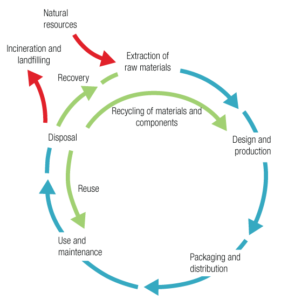July 2023
We are proud to announce that the second milestone of the PILATUS project (MS07 LCA methodology defined) was reached in July 2023: the Life Cycle Assessment (LCA) methodology that will be used in the PILATUS project has been set, with the methodological choices agreed with all parties involved in this task (ULIEGE as leader and involvement of PILATUS partners EURAC, EPFL and CPT) and compatible wit EU regulations. As well, the recommendation suggested during a LCA methodology harmonisation workshop [1] that took place in Brussels in March 2023 are included.
The chosen LCA methodology was defined according to the Product Environmental Footprint (PEF) framework recently set by the European Commission as a common approach to measure the environmental performance of a product through its life cycle (EU Commission recommendation 2021/2279, see figure below for a typical product diagram). The studies are complemented by Product Environmental Category Rules (PEFCR) specific for photovoltaic panels (“PEFCR Photovoltaic modules used in photovoltaic power systems for electricity generation. Version 1.2”)
In the PILATUS project, the LCA will be done in three stages: a preliminary LCA used for eco-design, a full LCA of the final technology and a comparative LCA with other PV technologies. All of these combined will provide guidance on the development and production upscaling of new photovoltaic technologies and potential environmental impacts related to this.

Figure 1. Typical product lifecycle diagram (as taken from https://www.lifecycleinitiative.org)
[1] On 13-14th of March 2023 an harmonisation LCA workshop on PV technologies was co-organised by the University of Liège, TNO, Fraunhofer ISE and the University of Siena. This workshop was with participants from more than 10 European founded photovoltaic projects to reach agreement on LCA methodology, because of the need to make LCAs comparable with each other in order to be able to provide a fair comparison of different emerging PV technologies.
